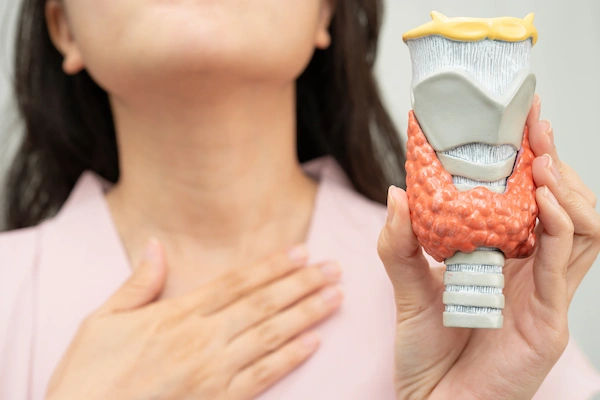Understanding The Causes, Symptoms And Treatment Of Thyroid Nodules
Learn about thyroid nodules, their causes, symptoms, diagnostic methods, and treatment options. Understand the importance of early detection and timely care for effective management.

Written by Dr Sonia Bhatt
Last updated on 13th Jan, 2026
The thyroid gland is a part of the human endocrine system that has the shape of a butterfly and is located in the neck, just below the Adam's apple. It is directly responsible for the secretion of essential hormones that control metabolism, heart rate, and energy, among other things.
The thyroid nodules are lumps within the gland that can vary in size, number and characteristics and are highly prevalent, especially among women. Most of the nodules found in the body are fairly benign, but there can be cells that are potentially determined to be cancerous. Additionally, their commonness increases with age, but not all of them are harmful, i.e. malignant. Routine screenings and proper diagnostics help differentiate benign from malignant cases.
This write-up covers the causes, signs, stages, testing procedures, and approaches to thyroid nodules.
Causes of Thyroid Nodules
The reason for thyroid nodule development is not always known, but there are numerous factors that may lead to their formation. Here are some potential reasons –
Genetic Factors
Genetics has a key role in the development of thyroid nodules. Though nodules can occur in anybody, the propensity increases if individuals have a family history of thyroid problems. Some people, for example, may also be genetically predisposed to the development of nodules in the thyroid gland.
Environmental Influences
External conditions that enhance the susceptibility of the formation of thyroid nodules include radiation exposure. Those who have been exposed to radiation in their lifetime, especially at a young age, have a high chance of developing thyroid nodules. Also, people living in iodine-deficient areas are at risk of developing this condition.
Associated Medical Conditions
Hashimoto’s thyroiditis, an autoimmune disease, is one of the reasons behind the development of this condition. Also, conditions like iodine deficiency, goitre, and other thyroid conditions can lead to this illness.
Types of Thyroid Nodules
Thyroid nodules are categorised into two main types: benign and malignant.
Benign Nodules
Benign thyroid nodules do not have malignant potential and are the most common of all other thyroid cysts. Usually, these nodules do not exhibit any symptoms, and experts suggest they must not be removed unless they are symptomatic.
Benign modules are highly prevalent, and the treatment only includes monitoring the condition and using ultrasound to detect its progression.
Malignant Nodules
On the other hand, malignant thyroid nodules are cancerous, but when diagnosed early, they can be treated. These nodules need surgical intervention or radiation with iodine radioactive isotopes to erase the malignant tracts.
Symptoms of Thyroid Nodules
Most thyroid nodules do not show symptoms, but when they do, it involves –
Visible Swelling or Lump
Thyroid nodules are usually asymptomatic, although the earliest sign may be an easily palpable nodule at neck level. This lump can be felt during an examination in cases where the patient is experiencing difficulty in swallowing.
Respiratory or Swallowing Difficulties
Follicular cysts, derived from the thyroid follicular cells, are usually benign but might reach significant size and exert pressure on the windpipe or the food pipe tube. Hence, individuals may experience difficulties in breathing or swallowing.
Hormonal Imbalances
Thyroid nodules can disrupt the hormone secretion. Sometimes, a nodule may cause the thyroid gland to secrete more hormones, leading to Hyperthyroidism. The signs of this condition include rapid heartbeat, losing weight, nervousness, etc. However, if a nodule makes the gland secrete less hormone, this leads to hypothyroidism, causing one to feel exhausted, lazy, gain weight, and possibly become depressed.
Consult Top Doctors For Thyroid Nodules Symptoms
Diagnostic Methods
For thyroid nodules, several procedures help doctors to determine whether their status is benign or malignant. Here are the leading diagnostics methods used for this condition –
Physical Examination and Medical History
Generally, the doctors conduct a physical examination of the throat and neck. After that, they ask the medical history of the patient and his/her family to understand whether this condition is the result of any previous illness or is simply genetic.
Imaging Tests (Ultrasound, CT, MRI)
Thyroid nodules can be felt by hand, but the size of the nodules, their characteristics, and their location are identified precisely by imaging techniques such as ultrasound, CT scans, or MRI. These tests assist in determining whether the nodule is benign or has the potential to be malignant.
Fine-Needle Aspiration Biopsy
If imaging tests raise the possibility of a nodule to be cancerous, a Fine-Needle Aspiration Biopsy (FNA biopsy) is used to get the answer. A small incision is made at the nodule, and a needle is used to extract a small piece of tissue, which is then tested to look for cancerous cells.
Risk Factors for Malignant Thyroid Nodules
The features that make the probability of thyroid nodules being malignant are –
Age and Gender
Thyroid cancer seems to affect women and people in the age bracket of 60 and above more often than others.
Family History of Thyroid or Other Cancers
Thyroid nodules may be malignant if the individual has a history of thyroid disease or any other type of cancer. Additionally, inherited genetic disorders increase the risk of thyroid cancer.
Radiation Exposure
Another cause of thyroid cancer is radiation exposure, particularly if this occurs during childhood. Such individuals will have a higher tendency to develop thyroid nodules as they grow old, provided they have undergone radiation therapy to the neck region.
Treatment Options
Thyroid nodule therapy varies as per its type: benign or malignant. Here are the leading treatment options that one may have –
Monitoring Benign Nodules
If the thyroid nodule is benign and the patient is asymptomatic, doctors may prefer to just monitor the nodule size and appearance by repeating ultrasounds in the future.
Medications for Hormone Regulation
When a thyroid nodule does lead to hormonal disturbances, the doctor may recommend drugs that will assist in restoring the hormonal balance. For instance, levothyroxine is utilised to treat hypothyroidism originating because of thyroid nodules.
Surgical Intervention
There are times when an individual develops a large nodule that may cause problems in swallowing and breathing or show symptoms of being malignant; then surgery is used to treat it. Doctors perform thyroidectomy, where they remove the infected part of the gland or, in advanced cases, the entire thyroid gland.
Radioactive Iodine Therapy for Malignant Nodules
Abnormal growth of thyroid nodules can be treated by radioactive iodine therapy. The radioactive iodine kills cancerous cells in the thyroid.
Prognosis and Complications
The thyroid nodules left untreated can have complications, including breathing, swallowing, or change of voice. However, in the case of malignant nodules, untreated cancer may progress to affect other organs of the body.
Having said that, the prognosis for thyroid nodules is quite good, particularly for benign ones. People with benign nodules usually do not have serious health issues. However, for the malignant ones, it is vital to start the treatment as early as possible, as delays worsen the prognosis of the disease.
Prevention and Management
The tips for prevention and effective management of thyroid nodules include –
Regular Medical Check-ups
It is recommended to receive a thorough check-up to identify thyroid nodules at an early stage. For individuals with an increased risk for thyroid issues, the doctor may ask them to get it checked using advanced diagnosis tests. Based on the results, physicians can start the treatment.
Lifestyle and Dietary Considerations
In terms of management, lifestyle and dietary changes help. Eating a healthy diet, cutting down on smoking and drinking, avoiding a sedentary lifestyle, and reducing the consumption of sugar and processed foods can help individuals to better deal with this condition.
Conclusion
Thyroid nodules are typically harmless. This is a prevalent condition with no significant threat, but this idea changes when it becomes malignant. However, with early intervention and the right treatment, it is possible to manage this condition and recover from the cancer. The doctors suggest that any noticeable lump at the base of the neck region must be checked without any delays. The medical experts will perform the required physical and lab tests to determine its nature and then decide the course of treatment. Individuals should look out for the symptoms and consult a doctor as soon as possible.
Consult Top Doctors For Thyroid Nodules Symptoms

Dr. Anand Ravi
General Physician
2 Years • MBBS
Bengaluru
PRESTIGE SHANTHINIKETAN - SOCIETY CLINIC, Bengaluru

Dr. Shruthi B
Endocrinologist
20 Years • MBBS,MD ( GEN MED) DM (ENDOCRIONOLOGY)
Bengaluru
Apollo Clinic, JP nagar, Bengaluru
Aditya Singh
Endocrinologist
8 Years • MBBS
Bengaluru
Apollo One Electronic City, Bengaluru

Dr. Chaithanya R
Internal Medicine Specialist Diabetologist
16 Years • MBBS, MD Internal Medicine, Fellowship in Diabetes(UK), CCEBDM(PHFI)
Bangalore
Apollo Clinic Bellandur, Bangalore
(75+ Patients)

Dr. E Prabhakar Sastry
General Physician/ Internal Medicine Specialist
40 Years • MD(Internal Medicine)
Manikonda Jagir
Apollo Clinic, Manikonda, Manikonda Jagir
(175+ Patients)

